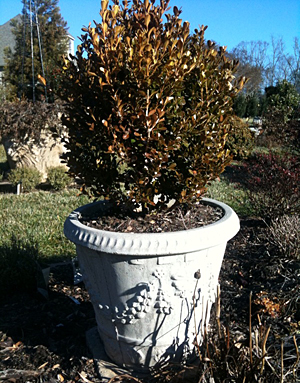 In our North Carolina formal garden we grow boxwood plants in large concrete pots. Although these plants are hardy in this geographic area they are susceptible to winter damage when we have windy, below freezing temperatures for an extended period of time. Under these conditions the soil in the pot is frozen and the plant can’t take in water through the roots, but it’s loosing water through the leaves. So we winterize these plants using an anti-transpirant to prevent water loss from the leaves that would result in drying or death of the leaves.
In our North Carolina formal garden we grow boxwood plants in large concrete pots. Although these plants are hardy in this geographic area they are susceptible to winter damage when we have windy, below freezing temperatures for an extended period of time. Under these conditions the soil in the pot is frozen and the plant can’t take in water through the roots, but it’s loosing water through the leaves. So we winterize these plants using an anti-transpirant to prevent water loss from the leaves that would result in drying or death of the leaves.
Anti-transpirants are barriers that prevent moisture loss from plant foliage and stems by transpiration. Transpiration is reduced by applying wax-like emulsions that form a thin film over the stomates that provide openings in the leaf surface for the exchange of gasses and the loss of water. Most anti-transpirants commonly used by nurserymen and gardeners (e.g., Wilt Pruf, Transfilm, Moisturin) are liquid sprays that are made from pine resin and are biodegradable and non-toxic to the eyes and skin. They are mixed with water and sprayed on both the top and bottom of the leaves to form the protective coating. When dried the spray forms a colorless glossy film on the leaves that slowly weathers away; about two months in warm temperatures and four months in cold winter conditions.
Winter use of anti-transpirants is especially useful for broadleaf evergreens such as azaleas, boxwood, hollies, laurel, and rhododendrons when they are exposed to freezing temperatures and strong drying winds. If these plants are grown in pots, like my boxwoods, it is even more important to prevent water loss since soil in the pot will freeze quicker than the ground. Nurseries frequently spray anti-transpirants on dormant roses, cane-berry plants, fruit trees and ornamentals to prevent moisture loss during storage and shipping. Another very useful application is keeping cut Christmas trees, wreaths, or other greens looking fresh by preventing water loss that results in wilting and premature needle drop.
Please note; blocking the stomates during warm weather by applying anti-transpirants could raise the temperature in leaves and affect photosynthesis adversely. Photosynthesis is the food manufacturing process carried on by green plants and is vitally necessary for growth; reduced photosynthesis means reduced growth. As a result, the benefits of using anti-transpirants should be weighed carefully when temperatures are warm and plants are actively growing.
As with all sprays always follow the instructions on the label carefully for mixing the correct concentrations, applying the spray, and cleanup.
Although somewhat difficult to find at garden supply stores, you can buy Wilt Pruf and other anti-transpirants from Amazon.com in ready-to-use and concentrated forms.
